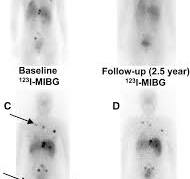Feokromasitoma ve paraganglioma tedavisinde yeni tedavi seçeneği olarak sunitinib
Feokromasitoma ve paraganglioma tedavisinde yeni tedavi seçeneği olarak sunitinib
Feokromasitoma ve paraganglioma milyonda bir görülen çok nadir tümörlerdir ve metastatik olma riskleri mevcuttur.
Succinate dehidrogenaz gene kompleksinde germline ya da somatik mutasyon hastalığın gelişiminde ana sebeptir.
Bu hastalık %80 oranında salgıladığı hormonlara bağlı hipertansiyonla ile kendini gösterir ve %70 oranında kemik metastazı saptanır.
Hastalık metastaz aşamasına geçtiğinde, dakarbazine bazlı kemoterapi ya da Meta-iodobenzylguanidine radyonüklid tedavisi kullanılmaktadır.
Bu tedavilerle maalesef istenen başarı elde edilememekte ve %20-30 oranında yanıt elde edilmektedir.
Feokromasitoma ve paraganglioma hastalığının temel patolojisi Succinate dehidrogenaz mutasyonuna bağlı oldu için, bu hastalarda HIF-2a düzeyi bu mutasyona bağlı olarak artar. HIF-2a düzeyi artmasına bağlı olarak VEGF ve PDGF düzeyi artarak, metastaz ve hastalığa progresyonu görülür.
Sunitinib, HIF-2a düzeyinin artmasına bağlı kanser hücrelerindeki artmış, çok sayıda ki Tirozin kinaz aktivitesini inhibe ederek bu kanserlerin metastaz ve progresyonunu engeller.
Fransa’da yapılan çok merkezli bir çalışmada, daha önce tedavi almış evre IV feokromasitoma ve paraganglioma hastalarında sunitib hastalıksız süreyi artırdığı saptandı.
Sunitibe bağlı yan etkiler, stomatit, asteni ve benzeri daha önce ilaçla ilişkili olan yan etkiler olduğu saptandı.
Bu çalışmayla, nadir görülen metastatik aşamada tedavi seçeneği pek olmayan feokromasitoma ve paraganglioma hastaları için Sunitinib bir tedavi seçeneği olduğu saptandı.
Kaynak
www.thelancet.com Published online February 22, 2024 https://doi.org/10.1016/S0140-6736(23)02554-0
Summary
Background No randomised controlled trial has ever been done in patients with metastatic phaeochromocytomas and paragangliomas. Preclinical and first clinical evidence suggested beneficial effects of sunitinib. We aimed to evaluate the safety and efficacy of sunitinib in patients with metastatic phaeochromocytomas and paragangliomas.
Methods FIRSTMAPPP is a multicentre, international, randomised, placebo-controlled, double-blind, phase 2 trial done at 14 academic centres across four European countries. Eligible participants were adults (aged ≥18 years) with sporadic or inherited progressive metastatic phaeochromocytomas and paragangliomas. Patients were randomly assigned (1:1) to receive either oral sunitinib (37·5 mg per day) or placebo. Randomisation was stratified according to SDHB status (mutation present vs wild type) and number of previous systemic therapies (0 vs ≥1). Primary endpoint was the rate of progression-free survival at 12 months according to real-time central review (Response Evaluation Criteria in Solid Tumours version 1.1). On the basis of a two-step Simon model, we aimed for the accrual of 78 patients, assuming a 20% improvement of the 12-month progression-free survival rate from 20% to 40%, to conclude that sunitinib is effective. Crossover from the placebo group was allowed. This trial is registered with ClinicalTrials.gov,
number NCT01371201, and is closed for enrolment.
Findings From Dec 1, 2011, to Jan 31, 2019, a total of 78 patients with progressive metastatic phaeochromocytomas and paragangliomas were enrolled (39 patients per group). 25 (32%) of 78 patients had germline SDHx variants and 54 (69%) had used previous therapies. The primary endpoint was met, with a 12-month progression-free survival in 14 of 39 patients (36% [90% CI 23–50]) in the sunitinib group. In the placebo group, the 12-month progression-free survival in seven of 39 patients was 19% (90% CI 11–31), validating the hypotheses of our study design. The most frequent grade 3 or 4 adverse events were asthenia (seven [18%] of 39 and one [3%] of 39), hypertension (five [13%] and four [10%]), and back or bone pain (one [3%] and three [8%]) in the sunitinib and placebo groups, respectively.
Three deaths occurred in the sunitinib group: these deaths were due to respiratory insufficiency, amyotrophic lateral sclerosis, and rectal bleeding. Only the latter event was considered drug related. Two deaths occurred in the placebo group due to aspiration pneumonia and septic shock. Interpretation This first randomised trial supports the use of sunitinib as the medical option with the highest level of
evidence for anti-tumour efficacy in progressive metastatic phaeochromocytomas and paragangliomas.

